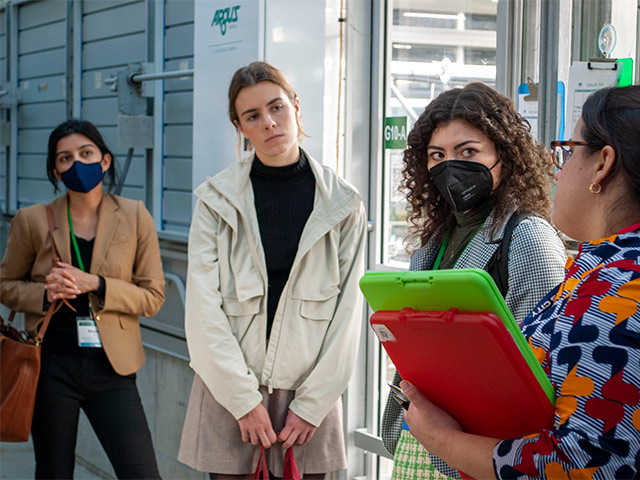Midwest Climate Summit Focuses on Community and Collaboration at Inaugural Summit
The Midwest Climate Collaborative (MCC) held its first in-person summit recently in St. Louis. The three-day gathering was attended by 325 people (including 80 virtual attendees) from 12 Midwestern states and featured keynotes and workshops on topics ranging from renewable energy and sustainable agriculture to workforce development and climate communications.
Growing a Climate-smart Workforce
The Danforth Center, a founding member of the collaborative, hosted a field trip that included a tour of its state-of-the-art facilities and a workshop titled: "Cultivating the Bench: Developing a Climate-Resilient and Inclusive Workforce in Agriculture and Plant Sciences." A panel moderated by Justin Raymundo, director of regional workforce strategy at BioSTL, led the group in a conversation about strategies to develop a climate-smart workforce for the future: "We need to attract, train, and retain a climate-smart workforce. It will be critical to mitigate and adapt to changing environmental pressures, and we strongly believe we're very appropriately situated here in the heart of Midwest and St. Louis to play an outsized role in cultivating that,” said Tyler Strom, Managing Director of Illinois Agri-Food Alliance.
Finding Common Ground
As climate change looms over rural agricultural communities, urban heat islands could serve as critical models for anticipating the future of economically important crops. Students at the Jackie Joyner-Kersee Foundation Food, Agriculture, and Nutrition Innovation Center in East St. Louis, IL, are collaborating with students in Waterloo, IL, to grow different types of corn while learning about bioengineering and plant monitoring technology: "Students learn from experts about what agriculture can look like in an urban area, what agriculture looks like rural areas and how, at the end of the day, a lot of the challenges are the same in both locations. Both are suffering from the loss of jobs in the area. Both are suffering from a lack of education," said Ash Kass, Education Project Manager at the Danforth Center. The program serves as a model for what the future of urban-rural climate science collaboration could look like.
Planning for the Future
Climate science collaborations also provide students with a chance to learn more about work in the agri-food industry at a time when generating interest is crucial to the future of our planet. "We're seeing a lot of unfilled positions associated with the agri-food industry in general, and I think that is because we haven't connected to people," said Michael Woods, division manager at the Illinois Department of Agriculture. "Not all cultural groups look at it in the same way. The African American community needs to be engaged differently than the Hispanic community. There's a plethora of careers, but the question is, how do we engage our communities?"
Mary Fernandes, Co-Founder and President of Solis Agrosciences, shared insights from an agtech innovation and startup perspective: "The world is changing, and what we want to do is be ready for that. Think about the jobs that might be going away, those that will be easily automated. We need to ensure that not only our children but also our employees are digitally advanced."
Following the panel, participants engaged in a facilitated planning conversation with BioSTL to map out critical jobs, skill sets, and competencies required for a climate-smart workforce and to explore how each stakeholder could contribute to industry-responsive career pathways.
“Innovative solutions for global challenges in environmental sustainability, climate-smart agriculture, supply chain resilience, food security, and national security will require an inclusive, world-class workforce. Meaningful collaborations across corporations, startups, academic institutions, community organizations, and the public workforce system are essential to preparing and supporting a workforce with the cross-cutting skills needed to address the climate challenges of today and of the future.” said Justin Raymundo.
Engaging the Community

Beyond hosting the “Cultivating the Bench” workshop, Danforth Center representatives also supported the Midwest Climate Summit in co-leading other interactive sessions around the St. Louis area. Taylor Harris, graduate student in Dr. Rebecca Bart’s lab, presented "Community-Driven Tools for Advocacy and Education: Science Notes and Community-driven Social Media,” along with Missouri Science & Technology Fellows. On behalf of the Climate Changents, a grassroots community of organizers and scientists in Missouri who tell stories about how air and water quality affect our everyday lives, the group discussed the work they do in the St. Louis community and how they translate that work and useful information into fun, educational content for Tiktok and Instagram.
The Danforth Center’s Director of Development Communications, Elizabeth McNulty, was on the panel titled “Stop, Collaborate and Listen: Engaging Key Audiences to Climate Action.” The session was attended by 100 people and watched virtually by another 33, making it one of the top-attended sessions of the conference. Along with speakers from the University of Michigan and Welsummer Consulting, McNulty discussed the importance of knowing your audience and offered climate communications tips and resources.
“The Midwest Climate Summit is unique because it brings people together across sectors to fit together the pieces of climate research, innovation, and action. The results were stronger partnerships, enhanced knowledge, and an outpouring of new opportunities to advance our region’s collective climate goals,” said Midwest Climate Collaborative Director Heather Navarro.